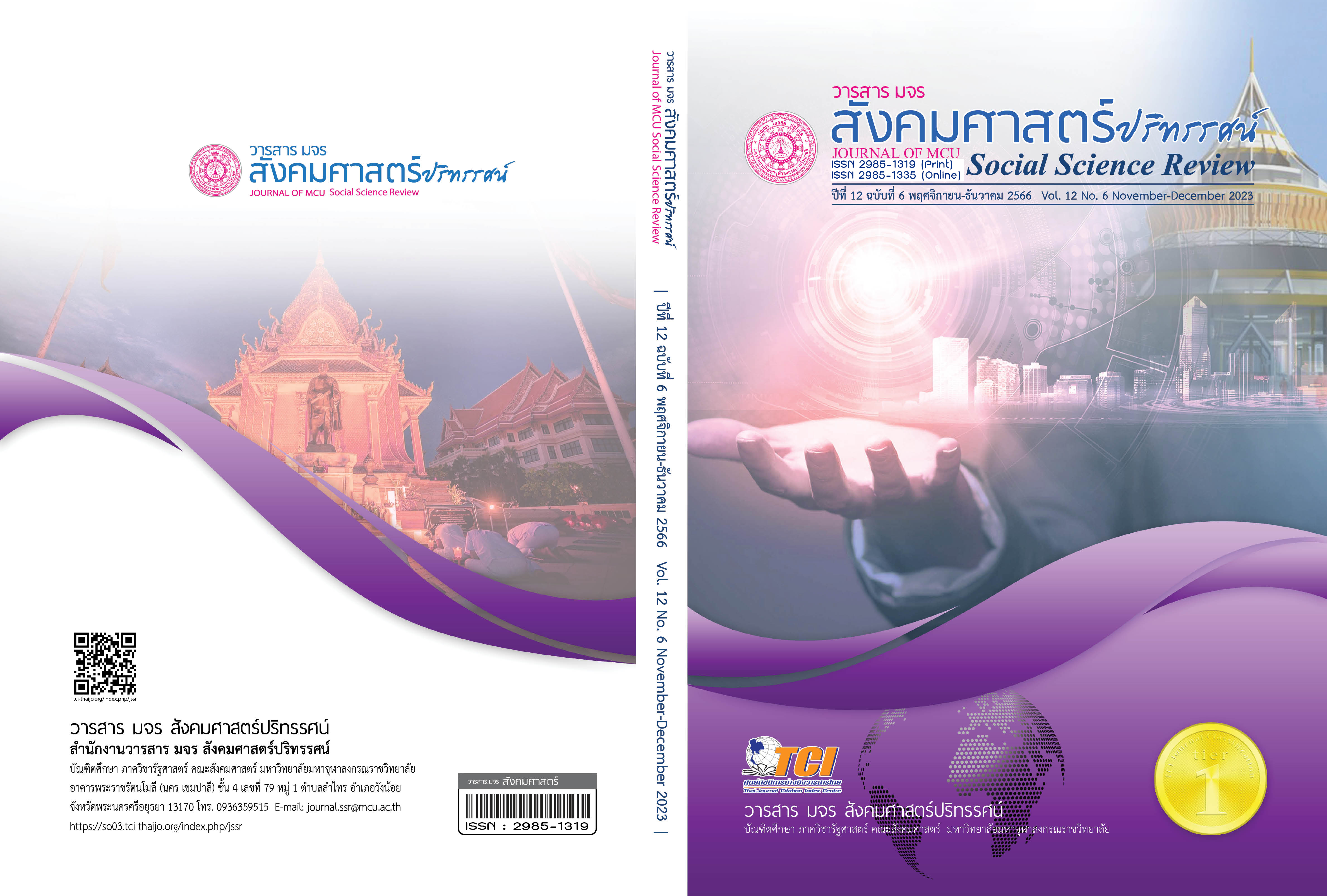C-BAC-R: รูปแบบเชิงทฤษฎีการบริหารจัดการแผนการเรียนทวิศึกษา โดยวิทยาลัยอาชีวศึกษาเอกชน
คำสำคัญ:
รูปแบบปัจจัยเชิงทฤษฎี, การบริหารจัดการแผนการเรียนทวิศึกษา, วิทยาลัยอาชีวศึกษาเอกชนบทคัดย่อ
บทความวิจัยนี้มีวัตถุประสงค์ เพื่อพัฒนาและประเมินรูปแบบโครงสร้างปัจจัยในการบริหารจัดการแผนการเรียนทวิศึกษาของวิทยาลัยอาชีวศึกษาเอกชน คือ วิทยาลัยเทคโนโลยีชัยภูมิบริหารธุรกิจ เป็นการวิจัยแบบผสมผสานวิธี กลุ่มเป้าหมายสำหรับการศึกษาครั้งนี้ประกอบด้วย 3 สถานศึกษา คือ โรงเรียนในสังกัด สำนักงานคณะกรรมการการศึกษาขั้นพื้นฐาน ที่เข้าโครงการเรียนร่วมระหว่างหลักสูตรมอาชีวศึกษากับหลักสูตรมัธยมศึกษาตอนปลาย และวิทยาลัยเทคโนโลยีชัยภูมิบริหารธุรกิจ ซึ่งเป็นวิทยาลัยอาชีวศึกษาเอกชนในสังกัดสำนักงานคณะกรรมการการอาชีวศึกษา ที่ตั้งอยู่ในจังหวัดชัยภูมิ เก็บรวบรวมทั้งโดยการสัมภาษณ์แบบกึ่งโครงสร้างสำหรับผู้บริหารโรงเรียนและวิทยาลัยที่เกี่ยวข้อง ผู้เชี่ยวชาญ 5 ท่าน และแบบสอบถามความพึงพอใจของผู้มีส่วนได้ส่วนเสีย 79 ราย การวิเคราะห์ข้อมูล เป็นการวิเคราะห์เนื้อหา การจัดกลุ่มคำ การรวบรวมเรียบเรียง การตีความ การหาค่าความถี่ ค่าร้อยละ ค่าเฉลี่ย ค่าเบี่ยงเบนมาตรฐาน ฐานนิยม และการอธิบาย
ผลการวิจัยพบว่า ปัจจัยเชิงทฤษฎีที่ประกอบเป็นรูปแบบการบริหารจัดการแผนการเรียนทวิศึกษาโดยวิทยาลัยเทคโนโลยีชัยภูมิบริหารธุรกิจ ได้แก่ 1) ความแสวงหาความร่วมมือ (Collaboration : C) 2) การเชื่อมโยงประสานงาน (Bridging : B) 3) การเข้าถึงพื้นที่และผู้เรียนกลุ่มเป้าหมาย (Accessing prospects : A); 4) การจัดการเรียนรู้ อบรม บ่มเพาะ (Cultivating :C) และ 5) ผลลัพธ์ (Results : R) อันหมายถึง ผลสัมฤทธิ์ทางการเรียนในง 4 รายวิชาที่คัดสรรที่ปรากฏว่าจากระดับผลการเรียนของผู้เรียน จำนวน 57 คน มีฐานนิยมผลการเรียนเป็น 3.0-4.0 (พิสัย = 2) ในขณะที่ความคิดเห็นและความพึงพอใจของผู้มีส่วนได้ส่วนเสียจำนวน 79 ราย มีค่าเฉลี่ยรวมเป็น 3.90 (SD = 0.78) หรือในระดับมาก เมื่อประเมินรูปแบบ รวมทั้งคู่มือโดยผู้ทรงคุณวุฒิ จำนวน 7 ท่าน พบว่า รูปแบบและคู่มือมีประโยชน์ เป็นไปได้ เหมาะสม ถูกต้องครอบคลุม และความรับผิดชอบตรวจสอบได้โดยรวมที่สอดคล้องกันด้วยค่าสัมประสิทธิ์แคปปาของ Fleiss อย่างมีนัยสำคัญที่ kf = 1.00
เอกสารอ้างอิง
Cruickshank, V. (2018). Considering Tyler’s Curriculum Model in Health and Physical Education. Journal of Education and Educational Development, 5(1), 207–214.
Equitable Education Fund. (2020). Upgrading Vocational Education for More Future Choices to Help Improve the Quality of Life to Meet the Needs of the World of Digital Age. Retrieved August 25, 2020, from www.eef. or.th/knowledge
Hoy, W. & Miskel, K. & Cecil, G. (2012). Educational Administration: Theory, Research and Peactice (9th ed). New York: McGraw Hill.
JCSEE. (2021). Standards for Educational Program Evaluation. Retrieved October 10, 2021, from https://jcsee.org/program
Joseph, M. (2017). How to Be a Collaborative Leader. Retrieved June 16, 2020, from www.eschoolnews. com/2018/01/30
Likert, R. (1961). New Pattern of Management. New York: McGraw-Hill.
Lima, J. Á, & Dâmaso, M. (2017). Inter-organizational Relations among Schools: Collaboration rather than Competition. Educational Management Administration & Leadership, 8(4), 1–16.
Makochekanwa, A., & Mahuyu, J. (2021). TVET Offering Institutions’ Perceptions on TVET Education: The Case of Zimbabwe. The African Review, 48(1), 168-195.
Marchant & Maurice, P. (1971). Participative Management as Related to Personnel Development. Library Trends. 20(1), 48-59.
Martin, T. (2021). The Effects of Collaborative Leadership Practices on Employees Satisfaction Levels. Doctoral Dissertation (ED.D.) (Organizational Leadership), Pepperdine University, USA.
Panit, W. (2012). The Way to Create Learning for Students in the 21st Century. Bangkok: Tathata. Public Company Limited.
Paudel, A. (2019). Girls' Transitions to Work through Higher-Quality TVET Programs in Nepal. In Policy Paper Echidna Global Scholars Program, 2(2), 1-29.
Sarhadi, M., et al. (2018). Participative Project Management as a Comprehensive Response to Postmodernism Criticisms: The Role of Communication. International Journal of Managing Projects in Business; Bingley, 11(4), 935-959.
Sibiya, A. T. & Nyembezi, N. (2018). Examining Factors That Shape Technical Vocational Education and Training Engineering Students' Understanding of Their Career Choices. Transformation in Higher Education, 3, 33-42.
ดาวน์โหลด
เผยแพร่แล้ว
รูปแบบการอ้างอิง
ฉบับ
ประเภทบทความ
สัญญาอนุญาต
ลิขสิทธิ์ (c) 2023 วารสาร มจร สังคมศาสตร์ปริทรรศน์

อนุญาตภายใต้เงื่อนไข Creative Commons Attribution-NonCommercial-NoDerivatives 4.0 International License.
เพื่อให้เป็นไปตามกฎหมายลิขสิทธิ์ ผู้นิพนธ์ทุกท่านต้องลงลายมือชื่อในแบบฟอร์มใบมอบลิขสิทธิ์บทความให้แก่วารสารฯ พร้อมกับบทความต้นฉบับที่ได้แก้ไขครั้งสุดท้าย นอกจากนี้ ผู้นิพนธ์ทุกท่านต้องยืนยันว่าบทความต้นฉบับที่ส่งมาตีพิมพ์นั้น ได้ส่งมาตีพิมพ์เฉพาะในวารสาร มจร สังคมศาสตร์ปริทรรศน์ เพียงแห่งเดียวเท่านั้น หากมีการใช้ภาพหรือตารางหรือเนื้อหาอื่นๆ ของผู้นิพนธ์อื่นที่ปรากฏในสิ่งตีพิมพ์อื่นมาแล้ว ผู้นิพนธ์ต้องขออนุญาตเจ้าของลิขสิทธิ์ก่อน พร้อมทั้งแสดงหนังสือที่ได้รับการยินยอมต่อบรรณาธิการ ก่อนที่บทความจะได้รับการตีพิมพ์ หากไม่เป็นไปตามข้อกำหนดเบื้องต้น ทางวารสารจะถอดบทความของท่านออกโดยไม่มีข้อยกเว้นใดๆ ทั้งสิ้น





